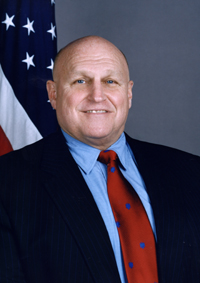 Image via Wikipedia
Image via Wikipedia
In the first issue of Prism, published by the National Defense University Press for the Center for Complex Operations (COO), Mr. Armitage gave an interview on Iraq, the 3Ds, military and civilian cultures and a whole lot more. Some highlights from the interview:
“They were victims of their own prejudices…”
I was surprised initially with the speed at which we were going into Iraq, and I never understood it. I was not opposed to attacking Iraq—I was opposed to the timing. I just couldn’t see it. I was surprised at the low number of forces—which Secretary [Colin] Powell was able to get doubled—but still far too few. […] And we got rushed into this timing by the military, who kept talking about the heat—that if it got to April and May, it would get too hot and we couldn’t operate. And I remember thinking and arguing—and it wasn’t just me, but Marc Grossman and others— saying, “Wait a minute, we own the night. We don’t have to fight in the daytime. We’re all-seeing at night—let’s do it! Don’t let the heat be the thing that gets us into war!” So it wasn’t that we were marginalized. We were allowed our voice, but no one wanted to hear it. They were victims of their own prejudices and their own ideology.
“All government property in sight.”
The culture of the military is to make chicken salad out of chicken poop. The culture of the military is, “Yessir, three bags full sir. I’ll get it done.”The culture of the military is embraced as far as I’m concerned in the most positive way by the first general order of the U.S. Navy and Marine Corps (different from the Army), which cautions a sentry to take charge of all government property on this post, and that includes people. And that’s frankly how Powell and I viewed the State Department—all government property at post. So that’s their going-in position, whether they’re a private or a colonel. The going-in position for USAID, State, Commerce, or Energy is not to take charge of all government property in sight, but to take charge of “mine.” I like to say that this is my little cubicle and I keep it clean, and if there is a light next door that’s not there or not on, if you are in the military you are going to go fix it. At least you are supposed to. All government property in sight. You’re doing not just your cubicle, whereas the civilians will just take care of their cubicle or space. When I or Secretary Powell would ever swear in an ambassador, we would tell him he could not be totally responsible for the development of our relationship between the United States and country X. But he would be held 100 percent accountable for the development of all personnel under his command—as officers and as citizens and people. If they have personal problems, they’re his. If they have lapses in their behavior, it’s his problem. He doesn’t overlook it, he works with them, he cautions them, he counsels them, and he does whatever it takes. And this is more the culture of the military.
“They’re not armed”
[W]e were at the State Department—we weren’t seized with the mission; we don’t have enough folks. USAID [U.S. Agency for International Development] isn’t the USAID you joined because it has been whittled away so much. So we have to relearn the lessons. It was not in any way a lack of courage among the civilian agencies; in fact, when I give speeches, I’ll say that these fellows—men and women—are out in all these exotic-sounding places—they’re not in canapé lines in London and Paris; they’re in Mazur and Kandahar and other places right alongside the men and women in uniform. Not a bit of difference, except one: they’re not armed.
“The Dr. Rice years were terrible…”
Yes, it is. I’ve been very heartened the last 3 ½ years that I’ve been out here, the number of people—many of whom I don’t even know—that worked for Powell and me, and to be frank with you, what they’ve said is, “The Dr. Rice years were terrible. The Powell years were wonderful. But don’t worry. We’re remembering what you said about taking care of your people. We’re remembering what you said about leadership.” So that fills me with enthusiasm, and the answer to your question is yes, it can happen. But it has to be inculcated. Unfortunately, I don’t think Ms. Clinton is from that mindset. She’s very good as Secretary of State, she’ll study her brief, but this takes effort from the bottom up. One has to be inculcated with this.
Read the whole interview here.
About the journal: PRISM is a quarterly national security journal tailored to serve policy-makers, scholars and practitioners working to enhance U.S. Government competency in complex operations by exploring whole-of-community approaches among U.S. Government agencies, academic institutions, international governments and militaries, non-governmental organizations and other participants in the complex operations space.
The first issue also includes feature articles by Senator Richard G. Lugar (Stabilization and Reconstruction: A Long Beginning) and Ambassador John E. Herbst (Addressing the Problem of Failed States: A New Instrument). It also has a From the Field section where USAID Afghanistan Director William M. Frej and David Hatch write about A New Approach to the Delivery of U.S. Assistance to Afghanistan. Frankly, I had a hard time wading through this “new approach” after reading through the OIG reports on USAID programs in Afghanistan. But feel free to check it out.
The journal’s submission guidelines include this tip: “Answer the So what? question. Asking an individual to read 3,000 to 5,000 words is asking a lot. After that reader is finished, he must be edified by what he has read and prepared to operationalize it in some way.”



No comments:
Post a Comment